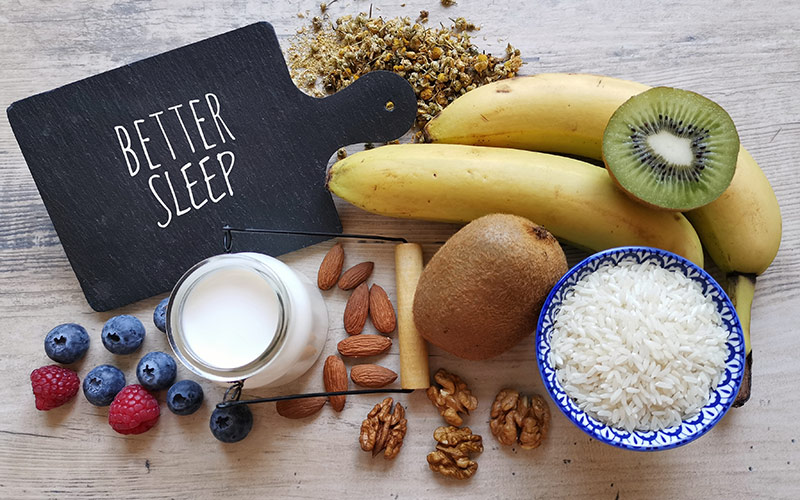Nutrition plays a crucial role in regulating hormones, metabolic processes, and overall well-being, all of which can influence the sleep cycle. By carefully selecting foods and planning your meals consciously, you can help your body prepare for sleep and promote a restful night’s rest.
Here are some nutrition tips to support more restful sleep:
|
|
|
1. Regular meals and timing: A regular eating schedule can help your body develop a stable sleep-wake cycle. Try to eat meals at the same times every day to support your biological rhythm. Avoid consuming large or heavy meals late in the evening, as this can burden digestion and cause discomfort, impacting your sleep.
2. Light evening meals: For dinner, choose easily digestible foods that are rich in nutrients but don’t overburden the stomach. Low-fat proteins, such as chicken or fish, combined with vegetables and whole grains, are a good choice. This combination provides your body with the necessary nutrients to regenerate without hindering digestion.
3. Avoiding stimulants: Caffeine and other stimulating substances should be avoided in the hours leading up to bedtime, as they can impair your body’s ability to relax and transition into sleep mode. Limit your intake of coffee, tea, cola, and chocolate, especially in the afternoon and evening.
4. Alcohol avoidance: Although alcohol may initially have a relaxing effect, it disrupts the sleep cycle and can lead to nighttime awakenings. Therefore, reduce your alcohol consumption and avoid consuming alcoholic beverages right before bedtime.
5. Staying hydrated: Adequate hydration throughout the day is important for your health and well-being, but limit fluid intake shortly before bedtime to minimize nighttime trips to the bathroom that could disrupt your sleep.
6. Sleep-promoting nutrients: Certain nutrients can help promote healthy sleep. Tryptophan, an amino acid found in foods like poultry, nuts, and bananas, supports the production of serotonin and melatonin, two hormones crucial for healthy sleep. Magnesium, found in foods like green leafy vegetables, nuts, and whole grains, helps promote muscle relaxation and reduce stress, contributing to a calmer sleep.
7. Maintaining a Healthy Overall Diet: A healthy diet not only directly contributes to better sleep but also helps improve overall health and alleviate symptoms of sleep disorders such as insomnia or sleep apnea. A balanced diet with a variety of fresh, unprocessed foods forms the foundation for healthy sleep.


By consciously designing your diet and paying attention to the right foods, you can help your body prepare for sleep and promote a restful night’s rest. Therefore, a balanced diet is an important component of a healthy sleep-wake cycle and helps ensure you wake up feeling refreshed in the morning.
